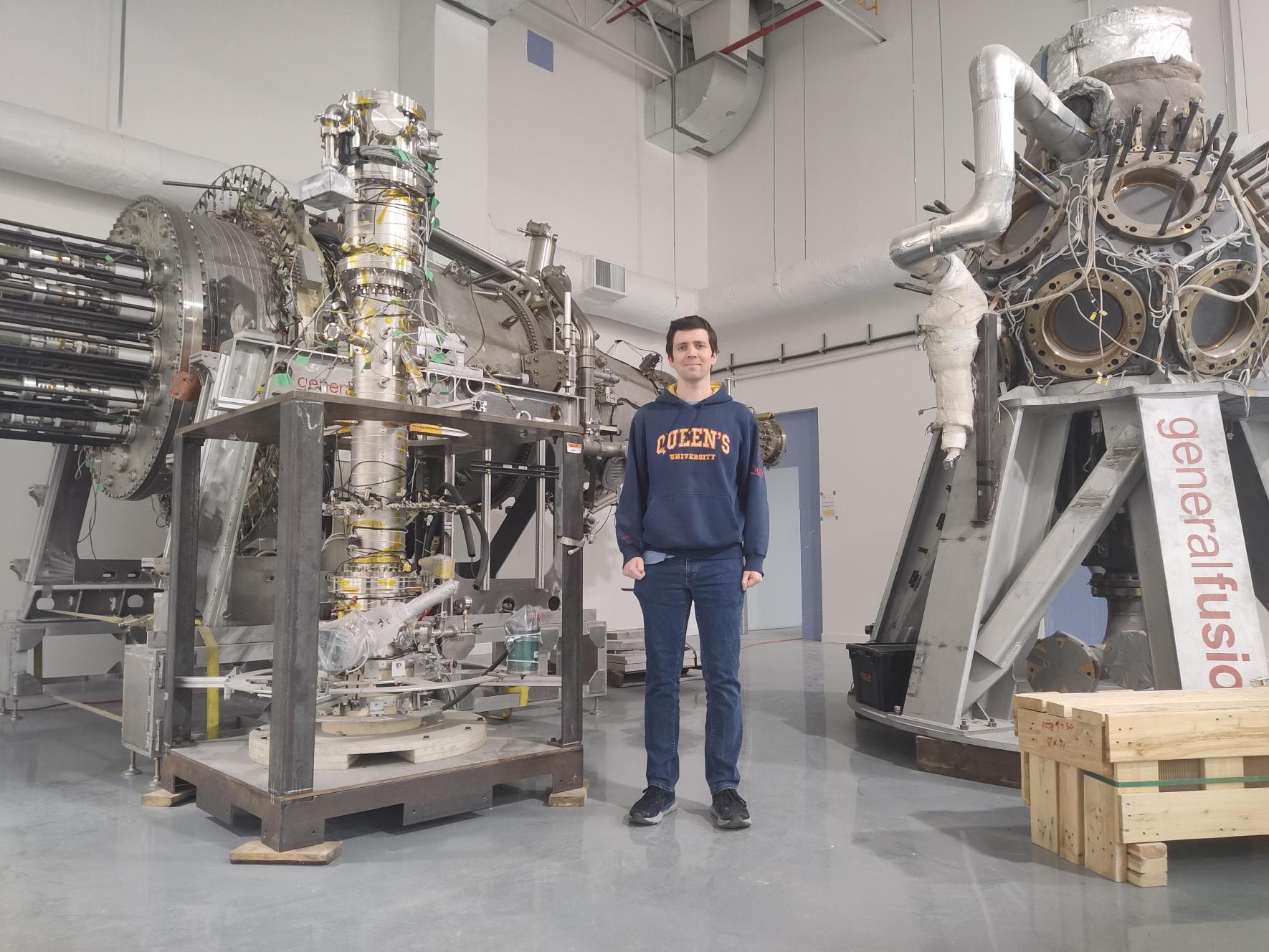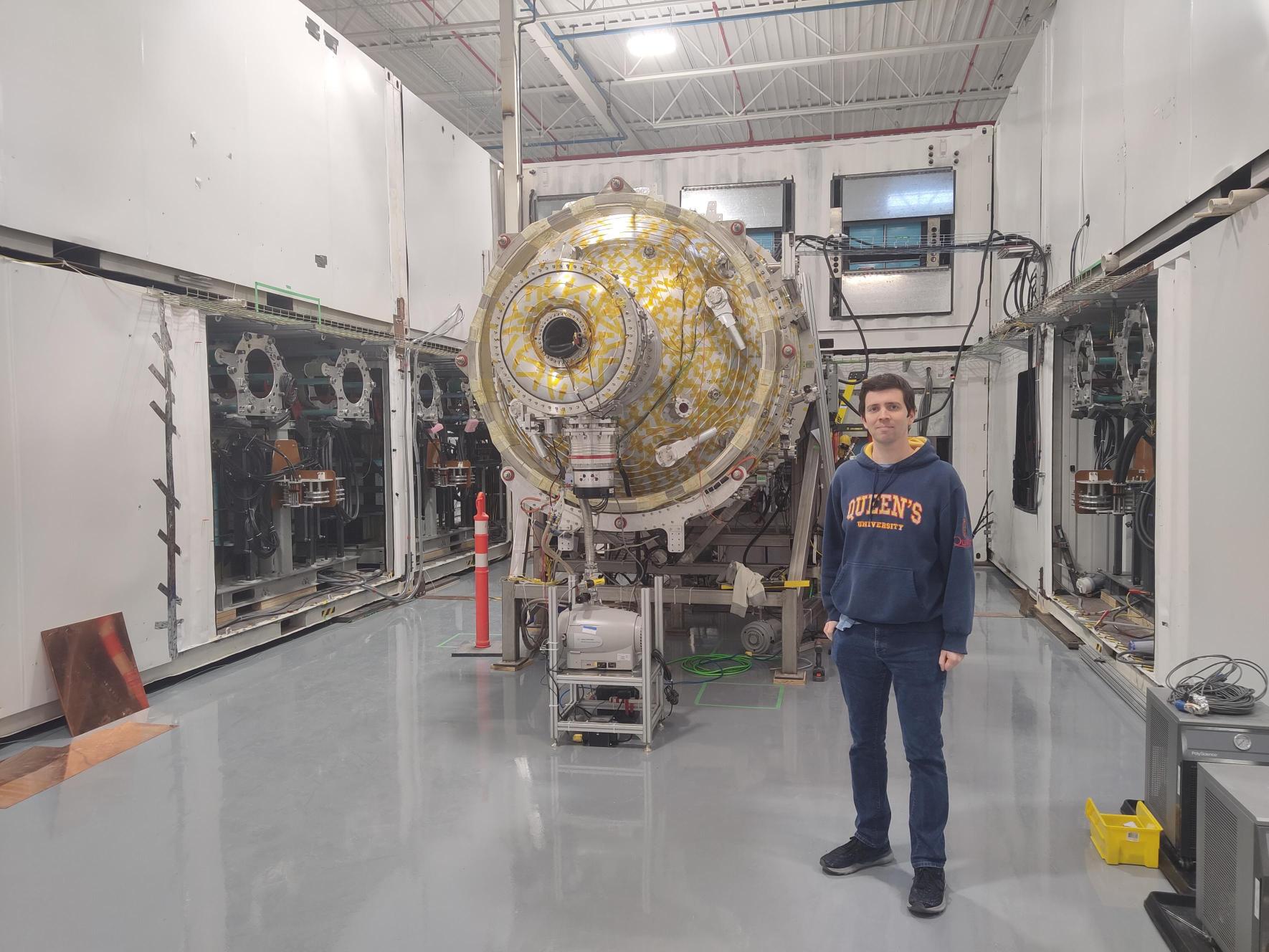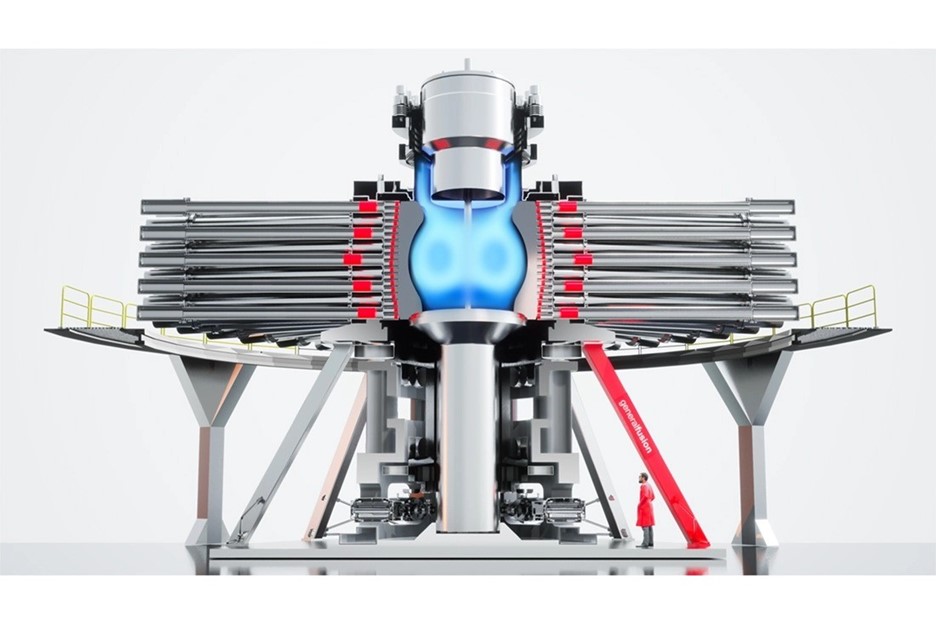Ten researchers from across the TRIUMF community have garnered over $750,000 in Mitacs funding as part of the research organization’s latest round of awards. The funding tranche supports the researchers’ work within several world-leading physics projects, including nuclear astrophysics experiments, medical isotope production optimization, and nuclear fusion for energy generation.

Image: Mitacs award winner Ryan Underwood at General Fusion in Burnaby, BC
“We are thrilled to see so many of our talented research community represented in these Mitacs awards,” said TRIUMF Director Nigel Smith. “This is a powerful testament to the calibre of the training and hands-on experiences that younger researchers can gain while at TRIUMF, and a strong signal of support for the excellent work these individuals are pursuing in as they continue careers in academia or industry.”
Mitacs is a nonprofit, national research organization that partners with a variety of Canadian institutions to provide financial support for early career researchers in pursuing excellent science and get their footing in the global STEM ecosystem. The organization offers several funding streams that connect students and researchers at various levels with academic organizations, research centres, and private businesses to help solve unique research and business challenges.
The TRIUMF recipients of the recent award set are:
Ryan Underwood: Investigation of Novel Photon Detection Devices for Fusion Diagnostic Applications (General Fusion)
Jan Glorius: Astrophysics Experiments with Rare Ion Beams (GSI Helmholtzzentrum für Schwerionenforschung)
Kim GwanDo: Direct diode laser pumped ring-dye laser for La spectroscopy (Korea University)
Guy Leckenby: Commissioning a particle detector for the GSI storage rings (GSI Helmholtzzentrum für Schwerionenforschung)
Nicolas Savard: Implicit Particle-In-Cell Plasma Model Development for D-Pace’s TRIUMF Licensed Filament-Powered Volume-Cusp H ̄ Ion Source (D-Pace)
Liang Xie, Kurtis Raymond: A simulation package for next generation single photon sensors (Ansys)
Kihong Pak: Development of a conceptual design for a recoil separator to study radiative neutron capture reaction using a low energy ion storage ring (Hanyang University)
Eleanor Dunling: High-throughput cyclotron target manufacturing (ARTMS)
Anand Mathai George: Development of a 10 mA DC H¯ Volume-Cusp Ion Source Powered by External RF (Radio Frequency) Antenna for Medical Radioisotope Production & Therapy Applications (D-Pace)
A major highlight in the list is the leading $160,000 commitment to Dr. Ryan Underwood as part of the Elevate Postdoctoral Fellowship Program, which comprises a series of competitive multi-year fellowships for researchers and students that bridge the gap between academia and technical industries.
The Elevate Fellowship will support Underwood’s work (under the supervision of TRIUMF research scientist and Group Leader, Physics Technology Fabrice Retière) to incorporate TRIUMF’s expertise in photon sensors into developing a neutron spectrometer for General Fusion, a Burnaby-based company pursuing a commercial fusion energy device.

Image: Underwood at General Fusion
Leveraging a proprietary magnetized target fusion design, General Fusion hopes to leapfrog existing fusion device designs and drive the development of sustainable fusion energy technology within the next decade. Building on an October 2022 announcement of a new memorandum of understanding with TRIUMF partner Canadian Nuclear Laboratories to pursue a series of joint projects to accelerate the deployment of commercial fusion power in Canada, General Fusion stated in December that its core technologies had already surpassed key performance targets.
Underwood’s work with General Fusion’s will focus on the measurement of neutrons, which are emitted as part of the fusion reaction, and ongoing work towards the company’s U.K.-based Fusion Demonstration Plant.
To enable temperature measurements of the ionized gas medium – plasma, the primary ingredient for fusion – Underwood and the General Fusion team are developing a device called a neutron spectrometer. By measuring the scattering angle and time of flight of neutrons emitted from the fusion reaction between two interaction points within the neutron spectrometer, the neutrons’ energy and the plasma’s temperature can be measured, providing critical insight into the fusion process.

Image: a cross-section of General Fusion’s Magnetized Target Fusion (MTF) technology / credit: General Fusion
For Underwood, the chance to work with General Fusion is an exciting opportunity to help the world transition to clean energy. The precision needed in the timing reconstruction is beyond state-of-the-art, and Underwood is drawing on his experiences and knowledge gained at TRIUMF, where his research focused on measuring the properties of silicon photomultiplier detectors for the nEXO experiment.
Commenting on the award, Underwood said, "I’m really excited to begin working in full with General Fusion. Winning this Mitacs grant to work with them on the neutron spectrometer for their Fusion Demonstration Plant is an amazing opportunity!”
Underwood will use his two years in the Mitacs fellowship to contribute technical expertise needed to ensure the success of General Fusion’s neutron spectrometer and potentially other diagnostic tools, while growing his industry skills with the special courses available to Mitacs Elevate winners.
Underwood’s award is part of Mitac’s thematic track, which grants an additional $10,000 to those working in areas such as renewable energy. As part of the Fellowship, Underwood will split his time between General Fusion and TRIUMF.
Congratulations to the TRIUMF Mitacs winners!
